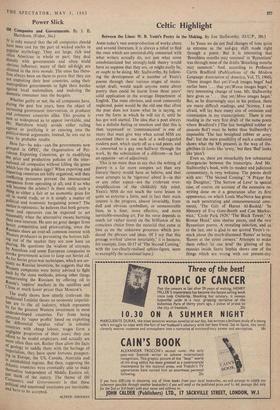Power Slick Oil Companies and Governments. By J. E. Hartshorn.
(Faber, 36s.) IT is only natural that the oil companies should have been cast for the part of wicked uncles in Popular mythology. They are large, rich and often American in whole or part; they deal directly with governments and often wield obvious influence; many of their oil-fielils are situated in the tiers monde. The onus has there- fore always been on them to prove that they are not exploiting their host countries, using their metropolitan governments to fight their battles against local nationalism, and mulcting the domestic consumer into the bargain.
Whether guilty or not, the oil companies have, during the past few years, been the object of increasing government intervention, in producer and consumer countries alike. This process is now so widespread as to appear inevitable, and Mr. Hartshorn wisely avoids either railing against or justifying it or entering into the politico-moral arguments; instead, he sets out to trace its probable results.
How far—he asks—can the governments now grouped in OPEC, the Organisation of Pet- roleum Exporting Countries, go in modifying the price and production policies of the inter- national oil companies without killing the goose Which lays the golden eggs? When exporting and importing countries are fully organised, will their conflicting pressures prevent the international Companies from operating at all, and if so who will become the arbiter? Is there really such 'a thing as either a fair or an economic price for oil in world trade, or is it simply a matter of Political and economic bargaining power? The author is optimistic; he believes that both govern- ment and operators can be expected to act reasonably when the alternative means, harming their own interests. He sees no great danger from Soviet competition and price-cutting, since the Russians share an over-all common interest with Western producers in preventing the bottom fall- ing out of the market they are now keen on sharing. He questions the wisdom of attempts ?3( American and some European companies to invoke government action to keep out Soviet oil. As for Soviet price-war techniques, which are cer- tainly no Russian invention, he suggests that the Western companies were better advised to fight back by the same methods, among other things embarrassing the Russians by offering oil to Russia's 'captive' markets in the satellites and China at much lower prices than Moscow's.
The study shows how utterly irrelevant the traditional Leninist theses on economic imperial-
ism to the oil industry, which represents by far the greatest Western investment in most underdeveloped countries. Far from being attracted by 'super profits' based on exploiting the differential 'surplus value' in colonial Countries with cheap labour, wages form a negligible proportion of their costs; they can afford to be model employers, and actually are more often than not. Rather than allow the facts of• geology to saddle them with the heritage of imperialism, they have spent fortunes prospect- ing in Europe, the US, Canada, Australia and in uninhabited regions. But then, supposing the Atlantic countries were eventually able to make th• emselves independent of Middle Eastern oil, lust think of the outcry. The theme of Oil Companies and Governments is that these Political and emotional overtones are inevitable, and have to be accepted. .
ALFRED SHERMAN






































 Previous page
Previous page